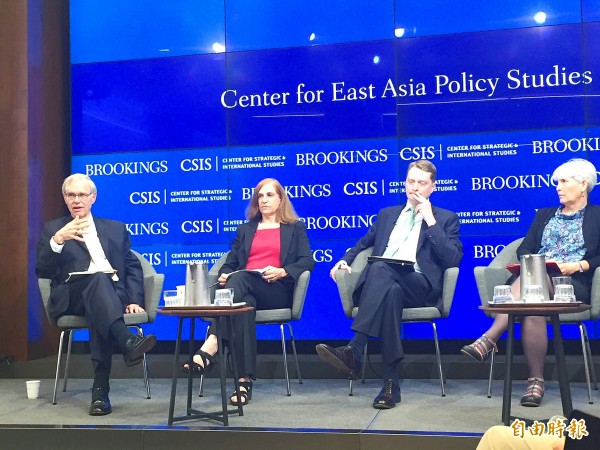《TAIPEI TIMES》 Academics urge US support for Taiwan

Brookings Institution senior fellow Richard Bush, left, speaks at a conference in Washington on Wednesday as Center for Strategic and International Studies China Power Project director Bonnie Glaser, second left, and Brookings research fellow Ryan Hass, second right, listen. Photo: Nadia Tsao, Taipei Times
POSITIVE APPROACH: Experts said it would be a mistake to invite Taiwan to join military exercises directly after uninviting China and the US should be pro-Taiwan, not anti-China
By Nadia Tsao and Jonathan Chin / Staff reporter in WASHINGTON, with staff writer
Beijing’s unilateral attempts to change the “status quo” across the Taiwan Strait should be protested by the US government at the highest level, Brookings Institution senior fellow Richard Bush said on Wednesday.
Bush, a former chairman of the American Institute in Taiwan, made the comments at a conference in Washington held by the Center for Strategic and International Studies (CSIS) and Brookings, titled “Taiwan Under Tsai Ing-wen: A Two Year Review.”
China is the only party in the trilateral relationship actively trying to alter the “status quo,” Bush said.
US officials at the highest level should urge China to reconsider their coercive behavior “and we will be watching,” Bush said.
It would be appropriate for US President Donald Trump, US Secretary of Defense James Mattis or US Secretary of State Mike Pompeo to deliver this message to their counterparts in the Chinese government, he said.
US policy should be dictated by the country’s interests and Washington should not let Chinese objections deter it from collaborating with Taiwan in areas of mutual interest, he said.
Several academics attending the event said that President Tsai Ing-wen’s (蔡英文) administration has been focusing on domestic reforms and did not commit any provocation against China.
However, China’s diplomatic and military pressure on Taiwan has only intensified, they said.
Over the past year, China has brought noticeably greater pressure to bear on Taiwan and expanded its efforts into arenas beyond military and diplomatic action, CSIS China Power Project director Bonnie Glaser said.
Beijing’s campaign to pressure 36 international airlines into listing Taiwan as a territory under its control is the latest example of its goal of imposing its “one China” principle on other countries, Glaser said.
While US airlines might not be able to withstand China’s economic pressure indefinitely, the companies telling Chinese officials to direct their political demands at the US government shows Chinese President Xi Jinping’s (習近平) weakness, not strength, she said.
Taiwan’s loss of diplomatic allies could weaken the nation’s ability to assert its sovereignty through diplomatic means, she said.
The situation has caused worries about the future of Taiwan and its democracy in many countries, but they are also concerned that they risk Chinese retaliation should they voice support for Taiwan, she said.
The US should work with like-minded countries to do more with Taiwan and call China out, Glaser said.
For that purpose, Washington should consider expanding the Global Cooperation and Training Framework from a bilateral Taiwan-US platform to include other partners, she said.
However, the US should not link strengthening the Taiwan-US relationship to punishing bad-faith actions from Beijing, she said, adding that it would not be wise to invite Taiwan to the US Navy’s Rim of the Pacific Exercise immediately after disinviting the Chinese military.
The US should have policies that are pro-Taiwan, not anti-China, Brookings research fellow Ryan Hass said.
Taiwan has been an able responder when the US is in need and should not be treated as a bargaining chip, he added.
The US wants to see a confident Taiwan that is capable of resisting the Chinese military threat, avoid economic overdependence on a single market and protect its dignity in the international community, he said.
Tsai wants to improve Taiwan’s competitiveness and the US should work with Taiwan to strengthen its economic ties with other countries, he said, adding that Washington should send high-level trade delegations to Taiwan to develop multilateral and bilateral trade.
新聞來源:TAIPEI TIMES




















